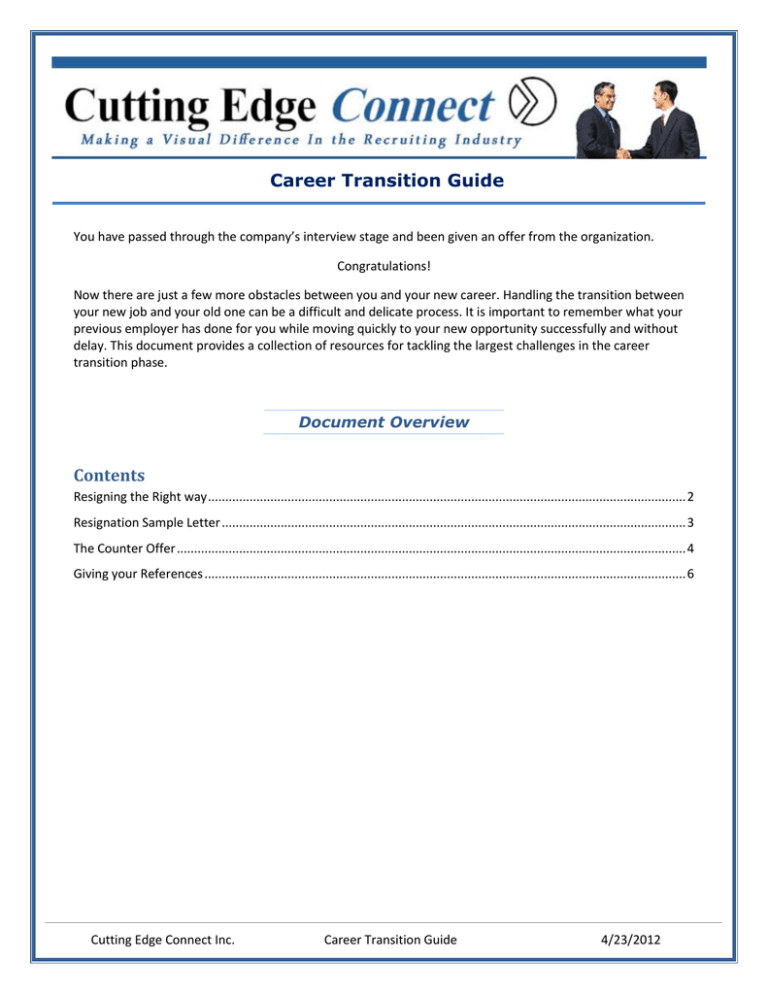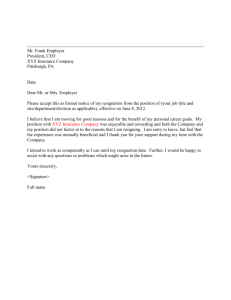
Career Transition Guide
You have passed through the company’s interview stage and been given an offer from the organization.
Congratulations!
Now there are just a few more obstacles between you and your new career. Handling the transition between
your new job and your old one can be a difficult and delicate process. It is important to remember what your
previous employer has done for you while moving quickly to your new opportunity successfully and without
delay. This document provides a collection of resources for tackling the largest challenges in the career
transition phase.
Document Overview
Contents
Resigning the Right way .......................................................................................................................................... 2
Resignation Sample Letter ...................................................................................................................................... 3
The Counter Offer ................................................................................................................................................... 4
Giving your References ........................................................................................................................................... 6
Cutting Edge Connect Inc.
Career Transition Guide
4/23/2012
Resigning the Right Way
Resigning the Right way
Leaving your employer? Stick to the high road
You never know when a poor exit might haunt you
By John Eckberg / Gannett News Service
Experts caution there is a wrong way and a right way to quit a job. Most companies remember workers not for
why they left — but how they left. And workers should be mindful of how they might need past employers
later in their career.
“Very often people who’ve done things that are particularly unprofessional or out of the box, they become like
urban legends,” said Allison Dubbs, director of public relations for Freedman, Gibson & White, and a Cincinnati
marketing Communications Company.
Workers who are headed to a new job should prepare themselves for a swirl of emotions between the time
they decide to leave and the time they actually leave, said Benjy Weisenburgh, executive recruiter/
information technology with Messina Management Systems.
They are accustomed to being in a subservient role to a boss, and by quitting they will feel they are challenging
authority. “In reality, during a resignation you are on a peer level with your manager as you are stating that
you will no longer work for him or her,” Weisenburgh said. But “we’ve seen people turn down jobs because
they have a fear of resigning,” Departing employees need to realize they are in an emotionally vulnerable
state when they leave. Most counter-offers — which, incidentally, Weisenburgh says should be rejected outof-hand — come four days before the departure date. “That is when anxiety is very high and second thoughts
can creep into reasoning,” he said.
Messina Management Systems gives clients a few key tips on leaving:
Always give at least two weeks’ notice.
Resign as soon as you have accepted a new position.
Do not give in to unrealistic requests by your soon-to-be ex-boss.
Try to finish big projects.
Talk with co-workers about what they need to know after you leave.
It’s much easier to leave a sterile cubicle than a workstation where photos of loved ones; trinkets from
travel or homilies are posted. Take home at least three personal items a day in the week before
resigning.
Cutting Edge Connect Inc.
Career Transition Guide
4/23/2012
Resignation Sample Letter
Resignation Sample Letter
(your street address)
(your city, state, zip code)
(date you announce your resignation)
(current supervisor name)
(current employer/company name)
(current employer street address)
(current employer city, state, zip code)
Dear (current supervisor name),
This letter announces my formal resignation from (current employer name) as of (the date you announce your
resignation). My decision to resign does not reflect any dissatisfaction with my current position with (current
employer name). I feel that my current position with (current employer name) has been most helpful in
enhancing my career development.
A new career opportunity has presented itself that I felt I simply could not turn down. I have formally accepted
a position with a new employer. I do not wish to consider a counter offer from (current employer name). I ask
only that you wish me well in this new career endeavor.
I have enjoyed working with you. I will always speak highly of (current employer name) and you personally.
Respectfully,
(your signature)
(your name)
Cutting Edge Connect Inc.
Career Transition Guide
4/23/2012
The Counter Offer
The Counter Offer
Reprinted from the National Business Employment Weekly
Never Accept a Counteroffer
Career Suicide
( Dow Jones & Company, Inc. All Rights Reserved.)
It's nice to be wooed back, but don't expect to stay long
BY PAUL HAWKINSON
A tax accountant with a Chicago-based public accounting firm accepted a top corporate position at a local
manufacturer that paid $15.000 more than he currently earned. But the accountant changed his mind after his
firm's senior partner made him a counteroffer. The partner dangled a plethora of incentives, including the
promise of a partnership in the near future. Three months later, after the tax season ended, the accountant was
fired.
A manufacturing manager with a medium-sized metal products company in Albuquerque, N.M., accepted a new
position that included a higher salary and better benefits. But he decided to stay put after his company agreed to
match the offer and told him of great things on the horizon. However, he wasn't told that the firm might be
merging with another. Six months after the executive decided to stay, he was merged out of his job.
Following nine months of unemployment, be landed a lower-paying position.
No matter what the company says when making its counteroffer, you'll always be a
fidelity risk!
Ask any executive recruiter and you'll hear dozens of heartbreaking stories like these involving Counteroffers.
Unfortunately, more executives seem to be getting and accepting them because of the inconsistent economy.
Companies are operating with reduced staffs and any defections from the ranks create problems for those who
remain. It's much easier for employers to sweeten the pot to keep executives from deserting than to conduct
grueling and expensive searches for replacements.
Mathew Henry, the 17th-century writer, said, "Many a dangerous temptation comes to us in fine gay colors that
are but skin deep." The same can be said for Counteroffers, those magnetic enticements designed to lure you
back into the nest after you've decided it's time to fly away. But in good times or bad, the dictum remains
constant. Counteroffers should never be accepted . . . EVER! Those few rare instances where accepting one is
beneficial occur about as frequently as being struck by lightning.
The Right Perspective
A counteroffer is an inducement from your current employer to get you to stay after you've announced your
intention to take another job. It doesn't include instances when you receive an offer but don't tell your boss, or
when you tell your employer about an offer you never intended to take in a classic "they-want-me-but-I'mstaying-with you" Ploy.
These are merely positioning tactics that can reinforce your worth by letting your boss know you have other
options. Mention of a true counteroffer, however, carries an actual threat to quit. Interviews with employers
who make counteroffers, and employees who accept them, have shown that accepting a counteroffer - tempting
as it may be - is tantamount to career suicide. Consider the problem in its proper perspective.
Cutting Edge Connect Inc.
Career Transition Guide
4/23/2012
What really goes through a boss's mind when someone quits?
"This couldn't be happening at a worse time."
"He's one of my best people. If I let him quit now, it'll wreak havoc on the morale of the department."
“I've already got one opening in my department. I don't need another fight now."
"This will probably screw up the entire vacation schedule."
"I'm working as hard as I can and I don't need to do his work too."
“I lose another good employee; the company might decide to 'lose' mc too."
“My review is coming up and this will make me look bad."
"Maybe I can keep him on until I find a suitable replacement."
"My word. We're working with a skeleton crew already. If I lose this one, we'll all be working around the clock
just to stay even."
What will the boss say to keep you in the nest? These comments are common:
"I'm really shocked. I thought you were as happy with us as we are with you. Let's discuss it before you make your
final decision."
"Aw geez, I've been meaning to tell you about the great plans we have for you, but it's been confidential until
now."
"The V.P. has you in mind for some exciting and expanding responsibilities."
"Your raise was scheduled to go into effect next quarter, but we'll make it effective immediately.”
“You’re going to work for whom?"
“How can you do this in the middle of a major project?' We were really counting on you."
(They’re always in the middle of one.)
Just a Stall Tactic
Let's face it. When someone quits, it's a direct reflection on the boss. Unless you’re really incompetent or a
destructive thorn in his side, the boss might look bad for allowing you to go. It's an implied insult to his
management skills. His gut reaction is to do what has to be done to keep you from leaving until he's ready.
That's human nature.
Unfortunately, it's also human nature to want to stay - unless your work life is abject misery. Career change,
like all ventures into the unknown, is tough. That's why bosses know they can usually keep you around by
pressing the right buttons.
Before you succumb to a tempting counteroffer, consider these universal truths:
•
•
•
Any situation is suspect if an employee must receive an outside offer before the present employer will
suggest a raise, promotion or better working conditions.
No matter what the company says when making its counteroffer, you'll always be a fidelity risk. Having
once demonstrated your lack of loyalty (for whatever reason), you will lose your status as a team player
and your place in the inner circle.
Counteroffers are usually nothing more than stall devices to give your employer time to replace you.
Your reasons for wanting to leave still exist. They'll just be slightly more tolerable in the short term
because of the raise, promotion or promises made to keep you.
Will you have to solicit an offer and threaten to quit every time you deserve better
working conditions?
Cutting Edge Connect Inc.
Career Transition Guide
4/23/2012
Giving Your References
Giving your References
(Begin Content)
Cutting Edge Connect Inc.
Career Transition Guide
4/23/2012







